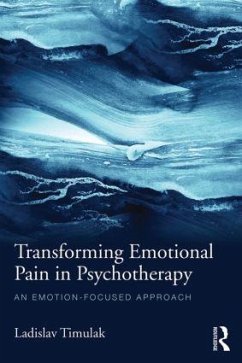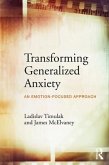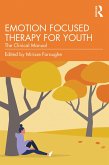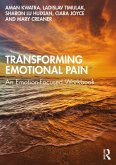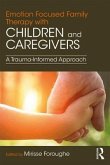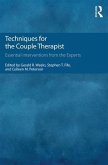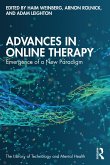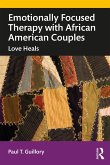Emotion-focused therapy is a research-informed psychological therapy that to date has mainly been studied in the context of depression, trauma and couple distress. The evidence suggests that this therapy has a lasting and transformative effect. Ladislav Timulak presents EFT as a particular therapeutic approach that addresses psychological human suffering, offering a view that puts more emphasis on attending to the distress, rather than avoiding or suppressing it.
Focusing on the latest developments in EFT, Transforming Emotional Pain in Psychotherapy presents a theory of human suffering and a model of therapy that addresses that suffering. The model of suffering assumes that the experienced emotional pain is a response to an injury that prevents or violates the fulfilment of the basic human needs of being loved, safe, and acknowledged. This book focuses on a particular way of transforming emotional pain in psychotherapy through: helping the client to tolerate the pain; assisting the client to identify the core of the difficult emotional experiences; identifying the needs connected to the core pain which are unmet or being violated, and responding (with compassion and protective anger) to the underlying needs of the client that transforms the original pain.
Transforming Emotional Pain in Psychotherapy provides an account of how emotional pain can be conceptualised and how it can be addressed in therapy. It provides practical tips for therapists working with emotional pain and shows how it can then be made more bearable and transformed allowing the client to be more sensitive to the pain of others, and to seek support when needed. This book will be essential reading for clinical and counselling psychologists, psychotherapists and counsellors in practice and training, as well as for fully qualified professionals undergoing further training in EFT.
Focusing on the latest developments in EFT, Transforming Emotional Pain in Psychotherapy presents a theory of human suffering and a model of therapy that addresses that suffering. The model of suffering assumes that the experienced emotional pain is a response to an injury that prevents or violates the fulfilment of the basic human needs of being loved, safe, and acknowledged. This book focuses on a particular way of transforming emotional pain in psychotherapy through: helping the client to tolerate the pain; assisting the client to identify the core of the difficult emotional experiences; identifying the needs connected to the core pain which are unmet or being violated, and responding (with compassion and protective anger) to the underlying needs of the client that transforms the original pain.
Transforming Emotional Pain in Psychotherapy provides an account of how emotional pain can be conceptualised and how it can be addressed in therapy. It provides practical tips for therapists working with emotional pain and shows how it can then be made more bearable and transformed allowing the client to be more sensitive to the pain of others, and to seek support when needed. This book will be essential reading for clinical and counselling psychologists, psychotherapists and counsellors in practice and training, as well as for fully qualified professionals undergoing further training in EFT.
"With this book Ladislav Timulak shows his insightfulness into the therapeutic change process and has made an original contribution, demonstrating how people transform emotional pain." - Leslie S. Greenberg, PhD, Distinguished Research Professor Emeritus, Department of Psychology, York University, Toronto, Canada
"This book provides a concise, clear, lively, compassionate, and personal introduction to contemporary Emotion-Focused Therapy, touching on the latest theory, practice and research. Timulak has developed an elegant, readable and useful formulation of the nature and transformation of human emotional suffering. Highly recommended. - Robert Elliott, PhD, Professor of Counselling, University of Strathclyde, Scotland, Professor Emeritus of Psychology, University of Toledo, USA
"A bold new development in emotion focused therapy. This book is a rich reflection on how human suffering is transformed. Delivered as an accessible guide that leaves plenty of room for contemplation, Timulak distills a complex theory of change which therapists will recognize from their practice." - Antonio Pascual-Leone, PhD, Associate Professor, Director of the Psychological Services and Research Centre, Department of Psychology, University of Windsor, Windsor, Canada
"This is a book that ... offers a coherent and research-informed theoretical framework, practical principles and procedures for conducting therapy, and a wealth of vividly-described case examples... I warmly recommend this book to all students and practitioners of counselling and psychotherapy..." - John McLeod, PhD, Emeritus Professor Counselling, University of Abertay, Scotland, Adjunct Professor of Psychology, University of Oslo, Norway
"This book provides a concise, clear, lively, compassionate, and personal introduction to contemporary Emotion-Focused Therapy, touching on the latest theory, practice and research. Timulak has developed an elegant, readable and useful formulation of the nature and transformation of human emotional suffering. Highly recommended. - Robert Elliott, PhD, Professor of Counselling, University of Strathclyde, Scotland, Professor Emeritus of Psychology, University of Toledo, USA
"A bold new development in emotion focused therapy. This book is a rich reflection on how human suffering is transformed. Delivered as an accessible guide that leaves plenty of room for contemplation, Timulak distills a complex theory of change which therapists will recognize from their practice." - Antonio Pascual-Leone, PhD, Associate Professor, Director of the Psychological Services and Research Centre, Department of Psychology, University of Windsor, Windsor, Canada
"This is a book that ... offers a coherent and research-informed theoretical framework, practical principles and procedures for conducting therapy, and a wealth of vividly-described case examples... I warmly recommend this book to all students and practitioners of counselling and psychotherapy..." - John McLeod, PhD, Emeritus Professor Counselling, University of Abertay, Scotland, Adjunct Professor of Psychology, University of Oslo, Norway

